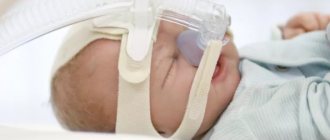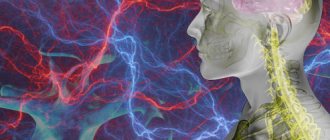Most often, meningitis occurs in children; doctors say that these cases are especially common in pediatrics. This disease has certain characteristics, for example, if treatment is started in a timely manner, the disease can be quickly cured. But at the same time, the symptoms of meningitis in children are very dangerous for the health and life of the child, especially if the child is not helped in a timely manner. The disease can be classified as a fairly rare, but extremely dangerous type of disease. In this article we will talk in more detail about the symptoms of this disease, as well as how to provide full assistance to the child.
First signs
According to Dr. Komarovsky, symptoms of meningitis in children arise quite quickly, since the incubation period lasts from two days to four days, in rare cases the incubation period extends for a week.
Temperature increase
Since the disease is quite severe, it manifests itself very quickly, first the baby feels unwell, and then the condition worsens significantly to severe.
That is why parents must detect signs of this disease in time and show the patient to a doctor.
First, fairly common symptoms appear that occur with any infection, these include:
- temperature rise to 39-40 degrees;
- severe weakness;
- the child loses his appetite;
- chills occur, alternating with bouts of fever.
Due to the prevalence of symptoms, parents often mistake these signs for a common cold, flu or acute respiratory viral infection. But later, additional signs of this disease begin to develop; these symptoms are almost the same in all children.
These signs include:
- The appearance of a hemorrhagic rash, which has a red-violet tint, and the spots may also turn yellow. The rash comes in various shapes and sizes, with spots spreading throughout the patient's body.
- The body temperature rises to 39-41 degrees, while the use of antipyretic medications does not give a positive result, and the temperature does not return to normal.
- The child becomes too active and excitable, or, on the contrary, lethargy and weakness occur. In one case, the baby cries a lot and sleeps poorly, in the other he sleeps a lot.
- Vomiting appears, which does not depend on food intake, and after vomiting there is no relief from the condition.
- The baby becomes more sensitive to sounds that are too loud and harsh, as well as to bright light.
- Increased sensitivity of the skin occurs, even a light touch becomes unpleasant for the patient.
If parents want to know how to recognize meningitis in children by symptoms, just consider the list of signs of this disease, which is presented above.
It is worth considering that the child’s body is individual and can react to the disease differently.
Diagnostics
Symptoms of viral meningitis in children cannot always be immediately identified, which is why doctors recommend immediately seeking help from a doctor.
Need a blood test
In the hospital, the child will be prescribed tests such as:
- A general blood test, in which you can see the number of leukocytes; if they are elevated, this will indicate the presence of infection in the body.
- Examination of the cerebrospinal fluid, as well as taking a lumbar puncture. The first analysis is collected into three tubes at once, and then immediately delivered to the laboratory. With this disease, the cerebrospinal fluid becomes cloudy and acquires a milky tint. The number of neutrophils increases to several thousand, the amount of proteins also increases, and glucose decreases significantly.
- Bacterioscopy is also carried out using cerebrospinal fluid, and swabs can also be taken from the child’s throat. In some cases, skin punctures and blood smears are required.
Who is recommended for vaccination?
Meningitis is especially dangerous for children under 2-3 years of age, whose immune system has not yet fully developed. In addition, the disease is dangerous for children with immunodeficiency, severe somatic diseases, and congenital malformations.
Vaccination against meningitis is not included in the compulsory vaccination schedule; it is provided free of charge according to indications if an outbreak of infection occurs or in risk groups. Parents can vaccinate for a fee in the following cases:
- children under two years of age attending children's groups (developmental classes, nursery or kindergarten);
- if you plan to travel to countries or regions with a high incidence of meningitis;
- frequently ill children of younger and preschool age.
The pediatrician may recommend vaccination individually if additional factors are present.
What are the symptoms of meningitis?
As Dr. Komarovsky says, if parents carefully monitor the health of their child, they will be able to quickly identify the presence of the first symptoms.
Headache in a child
It is enough to pay attention to the main signs, which include:
- Attacks of severe headaches in a patient, which are provoked by serious intoxication of the body. Toxins have a negative effect on the lining of the brain, causing pain as intracranial pressure increases significantly. Painful sensations can be sharp, pressing, bursting and sharp.
- The pain spreads throughout the head, so the child will not be able to indicate the location of the pain. Doctors note that these painful sensations do not subside with the use of painkillers, so if a child experiences this symptom, you should immediately call an ambulance.
- The child becomes very sensitive to bright light and loud sounds, the patient reacts negatively to light touches, as the sensitivity of the skin increases.
- Dizziness occurs and vomiting may occur. The described symptoms appear in the second and third stages of meningitis development.
Newborns may react slightly differently to the development of a dangerous disease; such babies experience additional symptoms:
- the baby becomes more whiny and nervous, or he sleeps a lot, but periodically cries out for no reason;
- there is a disturbance in the functioning of the digestive system, this manifests itself in the form of diarrhea, regurgitation and flatulence;
- in the later stages of the disease, the child experiences seizures.
It is worth noting the most dangerous symptoms of meningitis in children, these include the appearance of rashes and seizures. The fact is that the rash occurs due to the death of skin cells and tissues, which is triggered by the development of sepsis.
In this case, the disease develops rapidly and can be fatal. When the body temperature rises, spots appear on the child’s body, and convulsions occur, parents should immediately seek help from specialists.
Main signs of serous meningitis
Symptoms of serous meningitis in children can be different; this form of the disease differs in that not only inflammation of the lining of the brain occurs, but also the accumulation of purulent fluid inside the organ.
Skin sensitivity appears
The infection is provoked by an enterovirus; this disease develops quite quickly and aggressively. If a child does not receive medical care on time, then in 100% of cases there is death.
When this disease appears, parents may notice major health problems, these include:
- the appearance of hallucinations;
- increased skin sensitivity to touch;
- disturbances in the functioning of the digestive system;
- attacks of acute pain over the entire surface of the head.
There will also be other signs of this disease that are common. If parents notice the first symptoms, they should immediately call an ambulance so that specialists can provide qualified assistance to the child.
To cure this type of meningitis, the doctor may prescribe antispasmodics, as well as antipyretics, painkillers, diuretics and medications to combat viruses. In each case, the doctor separately selects therapy for the child.
Main signs of viral meningitis
The incubation period for viral meningitis in children does not last long, so symptoms appear fairly quickly.
Chills appear
The main features include:
- increased body temperature;
- bouts of severe vomiting;
- the appearance of chills;
- signs of ARVI development;
- the appearance of a rash on the baby’s skin;
- severe muscle tension;
- general weakness and drowsiness.
In this case, antiviral medications are used for treatment, and therapy is also used that helps eliminate intoxication of the body.
If the body temperature is very high, the doctor has the right to prescribe the use of medications to reduce the temperature.
Compatibility with other vaccines
Menactra was administered concomitantly with a polysaccharide typhoid vaccine and with an adsorbed tetanus and diphtheria toxoid vaccine for use in adults (Td) in persons aged 18–55 years and 11–17 years, respectively. The BCG vaccine should not be used simultaneously with the Menactra vaccine. Vaccines must always be administered to different parts of the body, using separate syringes for each of them.
Administering several vaccines on the same day does not place an excessive burden on the immune system. All vaccines in the Russian national vaccination calendar are interchangeable.
Treatment
To carry out full treatment, the child must be taken to the hospital, where he is examined by a doctor.
Treatment is carried out by a doctor
To help the patient, the doctor may use:
- Antibacterial therapy. It is commonly used to treat bacterial meningitis. Only a doctor can select the appropriate drug, having previously established the type of pathogen. The doctor prescribes streptomycin punctures, which are injected into the spinal canal; this therapy is performed for tuberculosis. In case of viral meningitis, the doctor must monitor the patient and also prescribe symptomatic treatment to alleviate the child’s condition.
- The doctor uses methods that help normalize intracranial pressure. The fact is that in any form of this disease, the amount of cerebrospinal fluid increases, for this reason severe headaches occur. To reduce pressure, a puncture of the cerebrospinal fluid is taken, this helps to reduce the amount of fluid, which will reduce the pressure. Additionally, the use of diuretic medications is recommended.
- It is important to carry out symptomatic treatment; it includes the use of antipyretics, vitamin complexes, as well as antiemetic medications and painkillers.
- The doctor uses special therapy, which is aimed at reducing intoxication of the body, and also uses saline solutions to restore water and salt balance in the body.
- If there is such a need, the patient is prescribed medications that reduce the number of seizures or eliminate these seizures.
- Hormonal agents can be used against inflammation; they are used only after a doctor’s prescription.
Possible reactions and complications
The pediatrician will tell you in detail how each vaccination is tolerated, what side effects are possible, and what parents should do. The most common occurrence of fever is after vaccination. This is a completely acceptable reaction, since a foreign substance is introduced into the body, the production of antibodies is necessary. Usually the fever is low and goes away in 2-3 days.
Possible consequences and complications are rare, as the drugs are well tolerated. They include allergic reactions, severe redness at the injection site, severe weakness for two days.











